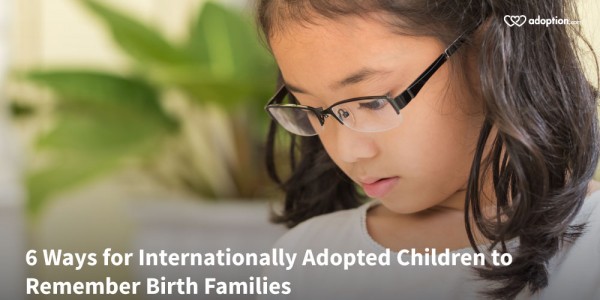“No matter how far apart, you’ll always be in my heart.” – Unknown
Although separated by blue oceans and green mountains and miles upon miles of cloud-filled sky, your child’s birth country will forever be his first home. It was there he was held, fed, and sheltered in foster care or in an orphanage until becoming part of your forever family.
And although he may feel loved and secure, it’s common for many adopted children to eventually and in their own way become curious about their first family. For infants, the memories may quickly become a blur as they grow in your love and the endless discovery that is their new surroundings—your home. For toddlers and older children, leaving the place they called home for two years or 10 years may have long lasting effects.
You can support your child in remembering his birth family or caregivers by making sure to share with him his story as early as possible. No matter how little or how much you know, it’s important to speak of his birth family in a respectful way and to let him know that without them, there would be no him.
1. Book It
Create a life book or scrapbook and include relevant information you may have received regarding your child’s birth family that you could share and that he could feel safe looking at or reading when the time comes.
2. Memories
Whether he spent time in a foster home or orphanage, do your best to bring home a memento—something that he may later take comfort in knowing was his. Did he have a favorite toy? Outfit? Craft? Make sure to ask to meet with a nurse or staff member who may have been especially close to him and try to get a photo or two. Take down names if you can. Document what you can. It may seem trivial today, but in five, 10, or even 20 years, it may be extremely important to your child. Until he met you, these people were his family.
3. Say Cheese
Take lots of pictures and video while you’re overseas–of the people, the landscape, the food, the streetscapes, and make lots of memories. Document these memories. Even if the pictures are not of his birth family, they will be of the place he started out his life. And you can definitely document the foster home and orphanage and the people who cared for him to look back on when he’s old enough to understand.
4. Google It
With the advent of the Internet and sites such as Google and YouTube, it’s easy to do research on just about any country. If he shows an interest, offer to sit with him and take a virtual trip together to discover interesting facts about his birth country. Be ready to answer questions this may spark.
5. Power of Prayer
For a while, my daughter asked to remember the orphanage staff in her prayers each night and so we did. Prayers are a wonderful way for a child to feel connected and to work through any loss or confusion he may be feeling.
6. Expression
Art is another great avenue for your child to explore his feelings and to express himself. Every so often, I’ll notice my daughters working in the colors of their birth country’s flag into school art projects. It’s always a reminder to me that they may have more on their minds than they are letting on. And it’s a great way for them to honor their birth family.
Although not all children may bring up the subject or seem to be thinking about their birth families or where they came from, that doesn’t mean they aren’t. By talking about their adoptions early on, you open the door for them to feel comfortable and safe in thinking about and remembering their birth families. And by providing them with stories, or life books, or photos, you will find that they will feel more comfortable opening up to you regarding questions or feelings yet to be explored.

